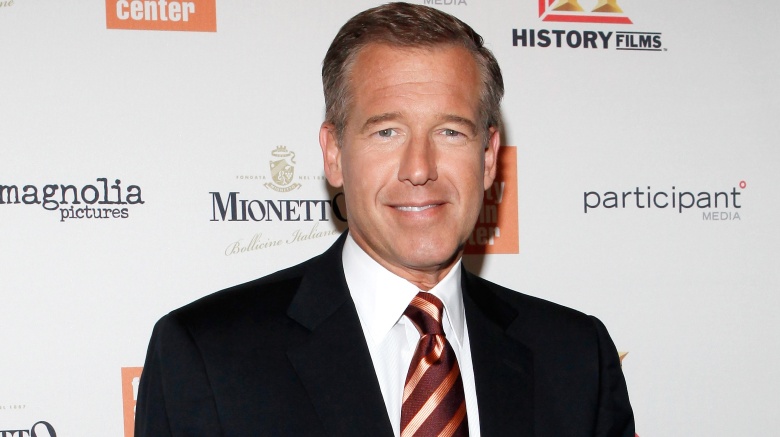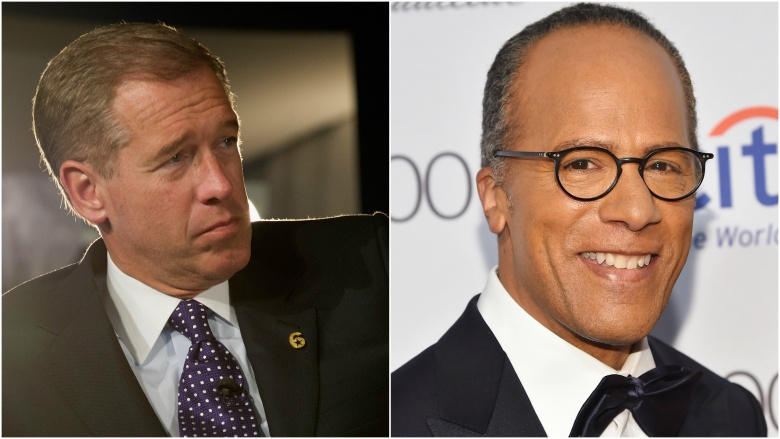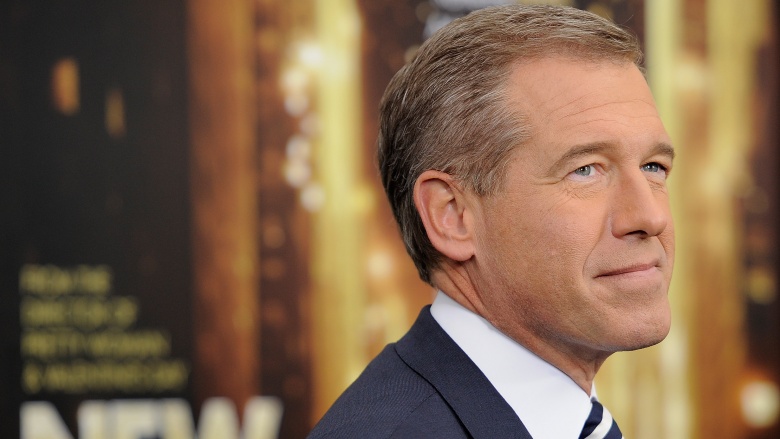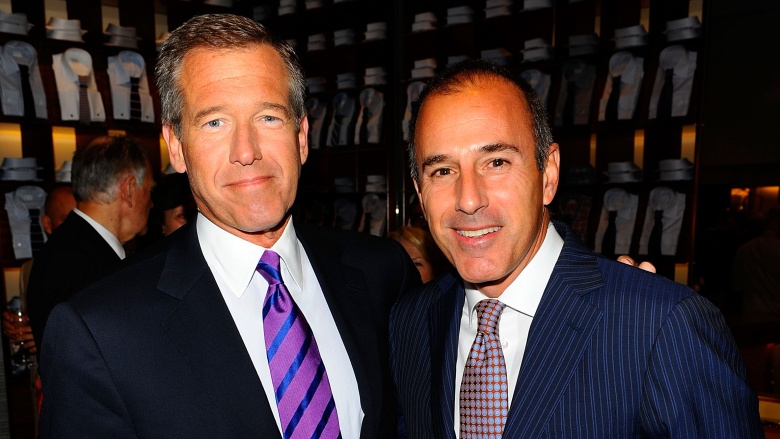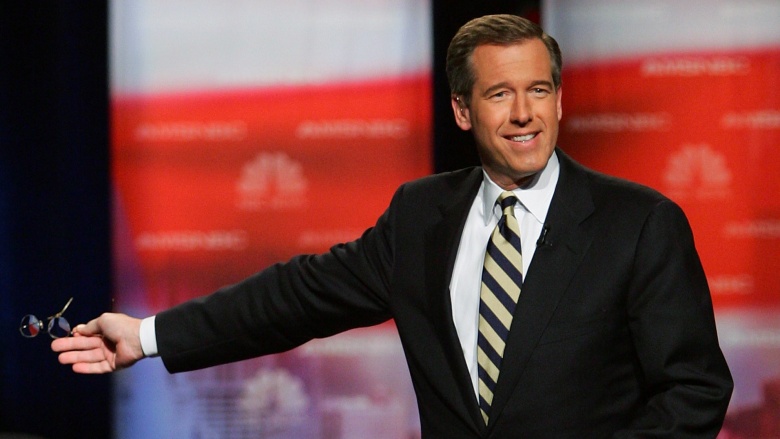The Real Reason We Don't Hear Much From Brian Williams Anymore
For decades, Brian Williams was seen as one of the most trusted anchors in network news; a modern-day Tom Brokaw or Walter Cronkite. Now, he's hosting a show at 11 p.m. on MSNBC. How did Williams go from the face of NBC News to a late-night cable program? Well, it's a little complicated.
Like so many Hollywood stories, this one begins with a scandal
In March 2003, while reporting on the U.S. invasion of Iraq for Dateline, Williams recounted a story in which the Chinook helicopter he and his camera crew were flying in was unexpectedly forced to make an emergency landing in the desert. On the ground, Williams and his team learned that one of the three Chinooks his team had been following had been struck by a rocket-propelled grenade, or RPG, and forced down. "Fired from the ground, [the RPG] punched cleanly through the skin of the ship, but amazingly, it didn't detonate," Williams reported.
That was all well and fine, until Williams began to alter the events of the story. As years passed, his version of events became much more exaggerated and dramatic. "Two of our four helicopters were hit by ground-fire, including the one I was in, RPG and AK-47," he told David Letterman 10 years after the incident. Around the same time, he revealed on Alec Baldwin's podcast Here's The Thing that he "briefly" thought he was going to die during the incident.
Then, in January 2015, Williams invited Command Sgt. Maj. Tim Terpak, one of the soldiers who was with him in Iraq, to a New York Rangers hockey game to celebrate Terpak's retirement. Williams covered the reunion on the NBC Nightly News, during which he recalled a "terrible moment" when "the helicopter we were traveling in was forced down after being hit by an RPG." Much of the brief segment was devoted to how Terpak and his crew kept Williams and his team alive during the dramatic ordeal.
He finally got caught
After Williams' report aired, Lance Reynolds, one of the crew members on that Chinook helicopter, accused the news icon of lying about what happened in Iraq via a blistering post on Facebook. "Sorry dude, I don't remember you being on my aircraft. I do remember you walking up about an hour after we had landed to ask me what had happened," Reynolds wrote, according to Politico. The military newspaper Stars and Stripes subsequently spoke to Reynolds and other crew members, who confirmed that Williams was not on the helicopter that had been hit but on another Chinook that arrived on the scene about an hour later.
Amid the controversy, Williams began to issue a number of apologies. "I would not have chosen to make this mistake," he told Stars and Stripes. "I don't know what screwed up in my mind that caused me to conflate one aircraft with another." He also issued an apology to the crew members on Facebook and on the NBC Nightly News, according to Politico.
"I want to apologize. I said I was traveling in an aircraft that was hit by RPG fire. I was instead in a following aircraft. We all landed after the ground fire incident and spent two harrowing nights in a sandstorm in the Iraq desert," Williams said on the NBC Nightly News broadcast. "This was a bungled attempt by me to thank one special veteran and by extension our brave military men and women veterans everywhere, those who have served while I did not. I hope they know they have my greatest respect and also now my apology."
NBC suspended him for six months
The scandal dealt a quick and devastating blow to Williams' career. Amid reports that he may have also lied about coverage during Hurricane Katrina in 2005, The New York Times reported that NBC launched an internal "fact-checking" investigation into the anchor's past reporting. The following day, Williams announced he would be taking a leave of absence and that Lester Holt would be taking his place in the interim.
"In the midst of a career spent covering and consuming news, it has become painfully apparent to me that I am presently too much a part of the news, due to my actions," Williams wrote in an internal memo to the NBC News staff. "Upon my return, I will continue my career-long effort to be worthy of the trust of those who place their trust in us."
His return never happened. On Feb. 10, 2015, NBC News President Deborah Turness confirmed in another staff memo that Williams had been suspended for six months without pay. "This was wrong and completely inappropriate for someone in Brian's position," Turness said, according to the The New York Times.
He was shipped off to MSNBC
After laying low for months, during which he reportedly spent most of his time near his Manhattan and Connecticut homes and in the gym, The New York Times confirmed in June 2015 that Williams would indeed be returning to NBC in mid-August 2015 as an "anchor of breaking news and special reports" for MSNBC. Holt would continue to anchor NBC Nightly News. Williams' new gig was described by the Times as a "humbling blow" that included a "demotion" and a lower salary.
He went on an apology tour
One day after Williams' gig at MSNBC was announced, he sat down with the Today show's Matt Lauer to give his first interview since the suspension. Williams spent much of the segment reflecting on how he came to exaggerate the story in Iraq, often blaming a "sloppy choice of words" and his own ego. "This came from clearly a bad place—a bad urge—inside me," he said. "This was clearly ego-driven, a desire to better my role in a story I was already in."
"Looking back, with such clarity now, it is so clear to me I said things that were wrong," he continued. "I told stories that were wrong. It wasn't from a place where I was trying to use my job and title to mislead. These were, while it doesn't matter anymore, in some cases years after the event. And in many different areas: live discussions, talk shows, discussions with students. I got it wrong. I own this, and I own up to this."
He's been seeking redemption ever since
Williams quietly made his official debut on MSNBC in September 2015, covering Pope Francis' much-anticipated visit to the United States. His role with the network has gradually increased in prominence, due in large part to the 2016 presidential campaign.
In August 2016, it was confirmed that Williams would anchor his own half-hour program at 11 p.m. called The 11th Hour. The program was designed to recap the daily events coming out of the race for the White House. "We are rapidly nearing the 11th hour for this presidential campaign," Williams said when the show debuted in September 2016. "So we will be here at this hour from now until Election Day, when we will cancel ourselves." Williams' new gig was seen by some as a tryout for future opportunities on the network. Whether it will actually turn into something else remains unclear, but The 11th Hour has already boosted MSNBC's ratings significantly in that time slot.
Williams' time at MSNBC hasn't been without hiccups. In July 2016, he accidentally referred to President Barack Obama as "President Reagan" during a report on troops in Afghanistan. But hey, at least that mistake is easier to call an authentic blunder.


